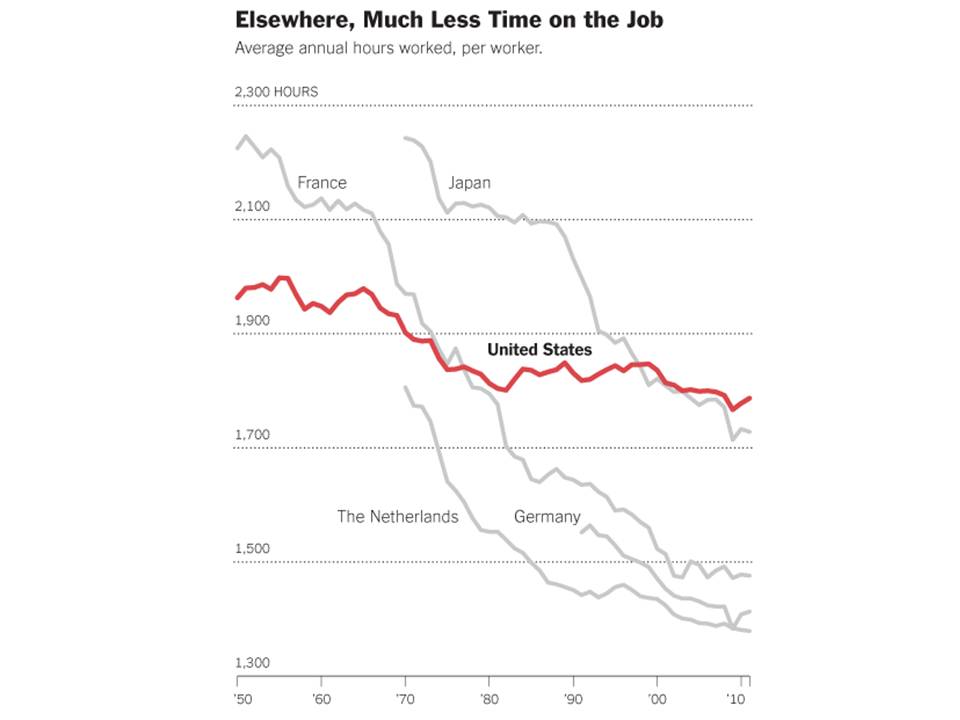
Source: Organization for Economic Cooperation and Development; “Why Gender Equality Stalled” by Stephanie Coontz, New York Times Sunday Review, February 17, 2013
Finally, a terrific article about why gender equality has hit a wall in the US. http://www.nytimes.com/2013/02/17/opinion/sunday/why-gender-equality-stalled.html?_r=0
It’s about time, and there just isn’t enough of it for an American to be an engaged parent and employee. Stephanie Coontz writes:
“When the United States work-family policies are compared with those of countries at a similar level of economic and political development, the United States comes in dead last.”
Why? Among other things, we are stuck in a model that maximizes time rather than productivity and innovation. How is it working for US companies? In terms of innovation and inclusion of talent, it’s not. 1% of companies drive 40% of new jobs, and only 1 in 10 sustains growth. Although women work proportionally, by and large, they do not lead.
How is it working for Americans at home? Coontz hits the nail on the head:
“What was really a work-place problem for families became a private problem for women. This is where the political gets really personal. When people are forced to behave in ways that contradict their ideals, they often undergo what sociologists call a ‘values stretch’ – watering down their original expectations and goals to accommodate the things they have to do to get by.”
“…tensions increase when a couple backslides into more traditional roles than originally desired.”
What to do? Put children at the center, then design our work with innovation in mind (e.g., more flexibility, less time overall…starting by eliminating ALL unproductive meetings!).
Coontz: “So let’s stop arguing about the hard choices women make and help more women and men avoid such hard choices. To do that we must stop seeing work-family policy as a women’s issue and start seeing it as a human rights issue that affects parents, children, partners, singles, and elders. Feminists should certainly support this campaign. But they don’t need to own it.”
Yes. It is the right thing to do for our children, but there is more to it. What I am suggesting here is that enabling employees to be “whole”, as parents especially, contributes to the currency of empathy in an organization (as summarized in the “Organizational Empathy and Innovation” page). Contrary to fears rooted in antiquated, industrial-revolution based models of the workplace, widely elusive growth and innovation will also be the prize for shifting our paradigms of work.
More talent engaged in fulfilling work, empathetic leaders who have not “stretched” their values at home or at work, secure parents, flourishing children, and innovative and growing businesses contributing to our economy – what’s not to love?!



I recently left my position as a family physician, working now only about 6 hours per week just to keep my licensure current, because of the deep irony I found in going to work (feeling really unproductive in any meaningful way) and dropping my kids off at school only to race around trying to pick them up before the school closed. Working a different “grid,” being able to flex up or down according to the needs of the family ecosystem, would be amazing. What’s funny is how people are responding to it, for instance, leaving my job being a “loss” to the community (there were several applicants for the job), or nonverbally giving me negative feedback in other ways. Changing like this definitely affects relationships, not necessarily in a negative way.
Thanks for your comment, Amy. “Working on a different ‘grid'”, being able to flex up or down according to the needs of the family ecosystem” is beautifully put!
At this point, parents (mostly women because men feel and/or they have fewer options) who apsire to work on a different grid end up leaving more traditional organizations and working entreprenuerially. We do contract work, start our own businesses, and/or join likeminded people in advanced organizational structures (even virtual ones). It’s ironic. We don’t necessarily work less. Traditional organizations lose people with talent and integrity, who would enrich their leadership pipeline. Importantly, so much of the WORK is actually flexible! Clients and patients and customers are NOT the primary drivers of inflexible schedules and unproductive hours!!
Your move took courage. I’m sure you thought about it long and hard, and that it’s just right for your family now. I’m also sure that entreprenuerial ways to continue to work meaningfully will emerge and evolve for you over time, and that other physicians coming up (especially women) will watch hopefully what you do.
We will learn from your example, as we do from the other professionals “working on a different ‘grid'”, which I’ll soon highlight on this blog.